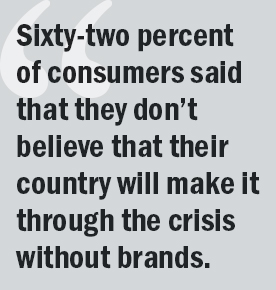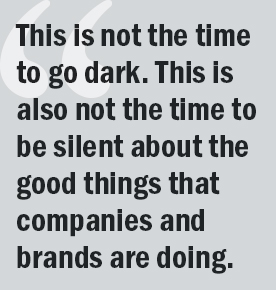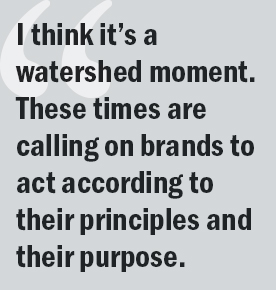Interviews
Don’t Go Dark. Do Not Stand on the Sideline. An Interview with Edelman’s Jennifer Cohan on Brand Response to COVID-19
Published: April 15, 2020
 With the spread of the coronavirus and the impact on economies around the world, brands have been responding to this sensitive and unprecedented situation in a variety of ways. It’s put them in the spotlight. On March 30, public relations and marketing consultancy firm Edelman, released its Special Report: Brand Trust and the Coronavirus Pandemic, a supplement to its annual Trust Barometer report. The special report emphasizes the power of brands—especially at this point in time.
With the spread of the coronavirus and the impact on economies around the world, brands have been responding to this sensitive and unprecedented situation in a variety of ways. It’s put them in the spotlight. On March 30, public relations and marketing consultancy firm Edelman, released its Special Report: Brand Trust and the Coronavirus Pandemic, a supplement to its annual Trust Barometer report. The special report emphasizes the power of brands—especially at this point in time.
In an interview with the INTA Bulletin, Jennifer Cohan, President of Edelman New York, shares her views and advice for brands as they navigate this challenging environment, deal with shifting priorities, and find ways to respond to the COVID-19 crisis in an effective and authentic way. Edelman New York is the firm’s largest office, with nearly 1,000 employees. In her role, Ms. Cohan advises clients, develops new services, and leads a group of professionals who evolve, promote, and protect many of the world’s most influential companies and brands.
Generally speaking, how should brands that are eager to contribute approach this unprecedented situation?
Fortunately, we’ve got some good data to help. We conducted a supplemental study of our Trust Barometer. It explores people’s expectations of brands specifically. We’ve seen an unprecedented desire for companies and brands to contribute to fighting the pandemic. But we also see that consumers are really counting on brands to do so. In fact, in our Trust Barometer special supplement, 62 percent of consumers said that they don’t believe that their country will make it through the crisis without brands, and 55 percent of people say that brands and companies are responding more quickly and effectively than their government.
What we do know as well is that there are three expectations that consumers have of brands right now. Firstly, is to do everything possible to protect the well-being and financial security of their employees and suppliers. In fact, 90 percent of people told us that it was important that brands do that. By a very similar margin, 89 percent of people around the world say they want brands to shift to producing products that help consumers meet the challenges of today. Similarly, 89 percent of people told us that they want brands to offer free or lower-priced products to help people at high risk and those whose jobs have been affected.
So what we see from all this data is that there’s a real clear desire for brands to partner with government and fill the gap in government’s response to the virus.

According to the 2019 Edelman Trust Barometer—In Brands We Trust?, 69 percent of consumers say a brand’s impact on society is the key reason for trusting a brand. Clearly, there’s an incentive for brands to share what they’re doing in response to COVID-19. How do they craft the right message in this context?
First, brands must focus their message on solutions, or how they’re serving their audience, not on selling. From the supplemental study, people want brand advertising and marketing to focus on how brands are helping people cope with COVID-19 and pandemic-related life challenges. In fact, 84 percent of people told us that that’s what they wanted, and more than three-quarters of people, 77 percent to be more precise, said that they want brands only to speak about products in ways that show they are aware of the crisis and the impact that those brands are having on people’s lives. People are exceedingly focused on COVID-19 right now and the way that a brand communicates must be mindful of that, and must be solution or service-oriented, not selling.
Companies are innovating daily to get in front of the crisis and remain in the public consciousness. Many are adapting their existing capabilities to current needs, often at their own expense. What is the upside for them?
I’ve said it often over the last few weeks: There is a mandate for brands to get involved. This is not the time to go dark. This is also not the time to be silent about the good things that companies and brands are doing. So 37 percent of people told us they’d recently started using a brand because of the innovative or compassionate way that they responded to the outbreak. A third of people said that they have convinced others to stop using a brand that was not responding appropriately. And two-thirds told us that how a brand responds will influence future purchases. What that’s telling us is people’s expectations of how brands behave right now have never been more pronounced. They’re telling brands:
- Show up and do your part, you’ve got a vital role to play;
- Don’t act alone, there’s real strength in collaboration with government and with NGOs because the magnitude of the problems are so large; and
- Solve, don’t sell. Focus your efforts on serving your employees, your customers, and the communities that you serve.
 Some efforts have been met with criticism but, in general, brands have received lots of positive free press coverage for their response to COVID-19. What is your advice for brands looking to get some exposure?
Some efforts have been met with criticism but, in general, brands have received lots of positive free press coverage for their response to COVID-19. What is your advice for brands looking to get some exposure?
Do good and tell people about it. There are legions of examples. Communicators are really essential at this point. The communications function of an organization is to make sure that while you’re promoting the positive good that you’re doing in the world, you’re also protecting. And to make sure you are getting credit for good work and inspiring it from others while not being seen as exploiting the situation. There are a lot of companies that rightfully worry that they’ll be seen negatively if they tell the stories of the good they’re doing. That’s where how you tell it becomes really, really important.
So there’s no guarantee you will get it right.
If you’re doing something good, and you’re doing it for the sake of being in service, and not exclusively to promote a brand, you will be rewarded. The second part is knowing who the right spokespeople are. I’ll start by saying that there are three ways of communicating that are important: One is starting with a foundation of facts, and while that might sound self-evident, the kind of information that people want needs to be really, really factual right now. Secondly, there is a heightened need for communication to be emotional, and not surprisingly, that companies communicate with empathy for what others are feeling.
The third point relates to who speaks. Experts are highly, highly trusted. Some of the usual brand spokespeople, such as celebrities and influencers, are amplifiers of those messages, but not always first in line like they might be under normal circumstances.
Brands run into trouble when they tell everybody else what to do, instead of taking action themselves. It’s harder for companies to legitimately tell everybody else what to do if they’re not practicing social distancing and keeping their employees safe.
 Bearing in mind that we’re still amid the crisis, what for you has been the biggest lessons learned so far in terms of brand response to a crisis of such magnitude?
Bearing in mind that we’re still amid the crisis, what for you has been the biggest lessons learned so far in terms of brand response to a crisis of such magnitude?
Brands must go back to their purpose. It can be a guidepost for doing the right thing. We’ve seen that a few times, where companies have said, “Let’s apply our core purpose to the problem at hand.”
The second thing I would say is brands have a variety of assets at their disposal that they can apply. Companies that have redeployed manufacturing to help provide equipment in response to the medical emergency have gotten a lot of attention. Rightfully so. But there are other kinds of assets that companies can apply. I know of one company—a retailer whose stores were closed—that donated all of the media time that they’d already bought to a not-for-profit. Brands should be looking at which of their assets are going to be most useful to helping solve the crisis.
Is this a watershed moment for the role of brands in society? And what do you think this means for brands beyond this immediate crisis?
I do think it’s a watershed moment. These times are calling on brands to act according to their principles and their purpose. Our data shows that consumers will reward those brands that contributed to the cause and acted with heroism. People are going to judge those that stood on the sideline in our most urgent moment of need. We believe that post-crisis, the world will require trust at its core and business to behave with trust at its core, and an updated brand mandate that’s expanded to solve problems for all—to protect, to care, to collaborate, and to innovate in the public interest.
Finally, if you could give your clients navigating the current crisis only one piece of advice, what would it be?
As a brand, ask yourself, “What will we be remembered for doing?”
Although every effort has been made to verify the accuracy of items in the INTA Bulletin, readers are urged to check independently on matters of specific concern or interest.
© 2020 International Trademark Association